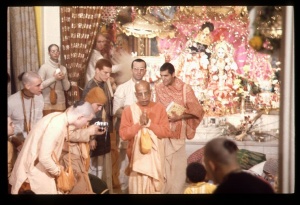CC Madhya 20.308: Difference between revisions
m (1 revision(s)) |
(Vanibot #0054 edit - transform synonyms into clickable links, which search similar occurrences) |
||
| (One intermediate revision by one other user not shown) | |||
| Line 1: | Line 1: | ||
{{ | [[Category:Sri Caitanya-caritamrta - Madhya-lila Chapter 20|C308]] | ||
<div style="float:left">'''[[Sri Caitanya-caritamrta|Śrī Caitanya-caritāmṛta]] - [[CC Madhya|Madhya-līlā]] - [[CC Madhya 20|Chapter 20: Lord Śrī Caitanya Mahāprabhu Instructs Sanātana Gosvāmī in the Science of the Absolute Truth]]'''</div> | |||
<div style="float:right">[[File:Go-previous.png|link=CC Madhya 20.307|Madhya-līlā 20.307]] '''[[CC Madhya 20.307|Madhya-līlā 20.307]] - [[CC Madhya 20.309|Madhya-līlā 20.309]]''' [[File:Go-next.png|link=CC Madhya 20.309|Madhya-līlā 20.309]]</div> | |||
{{CompareVersions|CC|Madhya 20.308|CC 1975|CC 1996}} | |||
{{RandomImage}} | |||
==== TEXT 308 ==== | ==== TEXT 308 ==== | ||
<div | <div class="verse"> | ||
māyā-saṅga-vikārī rudra—bhinnābhinna rūpa | :māyā-saṅga-vikārī rudra—bhinnābhinna rūpa | ||
jīva-tattva nahe, nahe kṛṣṇera ‘svarūpa’ | :jīva-tattva nahe, nahe kṛṣṇera ‘svarūpa’ | ||
</div> | </div> | ||
| Line 12: | Line 16: | ||
==== SYNONYMS ==== | ==== SYNONYMS ==== | ||
<div | <div class="synonyms"> | ||
māyā- | ''[//vanipedia.org/wiki/Special:VaniSearch?s=māyā&tab=syno_o&ds=1 māyā]-[//vanipedia.org/wiki/Special:VaniSearch?s=saṅga&tab=syno_o&ds=1 saṅga]'' — by association with ''māyā''; ''[//vanipedia.org/wiki/Special:VaniSearch?s=vikārī&tab=syno_o&ds=1 vikārī]'' — transformed; ''[//vanipedia.org/wiki/Special:VaniSearch?s=rudra&tab=syno_o&ds=1 rudra]'' — the form of Rudra; ''[//vanipedia.org/wiki/Special:VaniSearch?s=bhinna&tab=syno_o&ds=1 bhinna]-[//vanipedia.org/wiki/Special:VaniSearch?s=abhinna&tab=syno_o&ds=1 abhinna] [//vanipedia.org/wiki/Special:VaniSearch?s=rūpa&tab=syno_o&ds=1 rūpa]'' — having different types of forms; ''[//vanipedia.org/wiki/Special:VaniSearch?s=jīva&tab=syno_o&ds=1 jīva]-[//vanipedia.org/wiki/Special:VaniSearch?s=tattva&tab=syno_o&ds=1 tattva] [//vanipedia.org/wiki/Special:VaniSearch?s=nahe&tab=syno_o&ds=1 nahe]'' — still he is not called ''jīva-tattva''; ''[//vanipedia.org/wiki/Special:VaniSearch?s=nahe&tab=syno_o&ds=1 nahe]'' — nor; ''[//vanipedia.org/wiki/Special:VaniSearch?s=kṛṣṇera&tab=syno_o&ds=1 kṛṣṇera]'' — of Lord Kṛṣṇa; ''[//vanipedia.org/wiki/Special:VaniSearch?s=svarūpa&tab=syno_o&ds=1 svarūpa]'' — personal form. | ||
</div> | </div> | ||
| Line 19: | Line 23: | ||
==== TRANSLATION ==== | ==== TRANSLATION ==== | ||
<div | <div class="translation"> | ||
“Rudra, Lord Śiva, has various forms, which are transformations brought about by association with māyā. Although Rudra is not on a level with the jīva-tattvas, he still cannot be considered a personal expansion of Lord Kṛṣṇa. | “Rudra, Lord Śiva, has various forms, which are transformations brought about by association with māyā. Although Rudra is not on a level with the jīva-tattvas, he still cannot be considered a personal expansion of Lord Kṛṣṇa. | ||
</div> | </div> | ||
| Line 26: | Line 30: | ||
==== PURPORT ==== | ==== PURPORT ==== | ||
<div | <div class="purport"> | ||
Rudra is simultaneously one with and different from the viṣṇu-tattva. Due to his association with māyā, he is different from the viṣṇu-tattva, but at the same time he is an expansion of Kṛṣṇa’s personal form. This situation is called bhedābheda-tattva or acintya-bhedābheda-tattva, simultaneously one and different. | Rudra is simultaneously one with and different from the ''viṣṇu-tattva''. Due to his association with ''māyā'', he is different from the ''viṣṇu-tattva'', but at the same time he is an expansion of Kṛṣṇa’s personal form. This situation is called ''bhedābheda-tattva'' or ''acintya-bhedābheda-tattva'', simultaneously one and different. | ||
</div> | </div> | ||
__NOTOC__ | |||
<div style="float:right; clear:both;">[[File:Go-previous.png|link=CC Madhya 20.307|Madhya-līlā 20.307]] '''[[CC Madhya 20.307|Madhya-līlā 20.307]] - [[CC Madhya 20.309|Madhya-līlā 20.309]]''' [[File:Go-next.png|link=CC Madhya 20.309|Madhya-līlā 20.309]]</div> | |||
__NOTOC__ | |||
__NOEDITSECTION__ | |||
Latest revision as of 22:42, 19 February 2024

A.C. Bhaktivedanta Swami Prabhupada
TEXT 308
- māyā-saṅga-vikārī rudra—bhinnābhinna rūpa
- jīva-tattva nahe, nahe kṛṣṇera ‘svarūpa’
SYNONYMS
māyā-saṅga — by association with māyā; vikārī — transformed; rudra — the form of Rudra; bhinna-abhinna rūpa — having different types of forms; jīva-tattva nahe — still he is not called jīva-tattva; nahe — nor; kṛṣṇera — of Lord Kṛṣṇa; svarūpa — personal form.
TRANSLATION
“Rudra, Lord Śiva, has various forms, which are transformations brought about by association with māyā. Although Rudra is not on a level with the jīva-tattvas, he still cannot be considered a personal expansion of Lord Kṛṣṇa.
PURPORT
Rudra is simultaneously one with and different from the viṣṇu-tattva. Due to his association with māyā, he is different from the viṣṇu-tattva, but at the same time he is an expansion of Kṛṣṇa’s personal form. This situation is called bhedābheda-tattva or acintya-bhedābheda-tattva, simultaneously one and different.